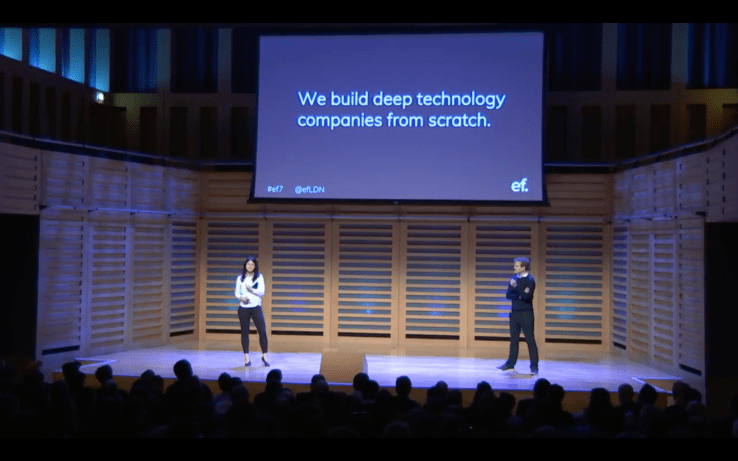Company builder Entrepreneur First raises $12.4M led by Greylock, Reid Hoffman joins board

Well, this is quite a coup. Entrepreneur First (EF), the London-headquartered company builder that invests in individuals “pre-team, pre-idea” to help create new technology startups, has raised $12.4 million in new funding led by Silicon Valley’s Greylock Partners.
The investment also sees Greylock partner and co-founder of LinkedIn Reid Hoffman join the board. In a call, Hoffman described EF as an incubation model that “contradicts common wisdom,” and exactly the sort of idea he seeks to back.
Other investors joining the round include Mosaic Ventures (I understand Mosaic’s Toby Coppel first introduced Hoffman to EF), Founders Fund, Lakestar Capital and Deep Mind founders Demis Hassabis and Mustafa Suleyman.
Notable is that a number of EF alumni are also investing. They are Rob Bishop and Zehan Wang of Magic Pony Technology — the AI startup sold to Twitter for a reported $150 million and the company builder’s only financially significant exit to date — and Bryan Baum, who co-founded Represent, which was sold for a reported $100 million but went through the program before EF insisted on taking a stake in the companies it helps create.
It should also be noted that the new funding round is for operational costs and to further scale the EF program. In other words, it is entirely separate from the company builder’s investment fund from which it directly invests in the founders and startups it helps create. Therefore, this is more akin to EF as a startup in its own right raising funding.
The ability to create a portfolio of great entrepreneurship and great companies is something I treat as a personal mission
Founded back in 2011 by Alice Bentinck and Matt Clifford, EF bills itself as a “talent first” investor that targets the best technical and domain talent in Europe and Singapore — both recent graduates and also people already working at tech companies — and invites them to apply to its six-month program where they find co-founders and in turn found startups.
The EF program includes financial support in the form of a monthly stipend for living costs while founders find their co-founders and decide on an idea. This is then followed by pre-seed funding, in addition to office space, legal and administrative support and mentoring and advice from the EF team and external entrepreneurs from the wider U.K. and Singapore startup scene. There’s also a separate follow-on fund to co-invest in alumni companies at the seed and Series A stage.
The idea is to help talented individuals become entrepreneurs, and companies be founded, that otherwise might not. To date, EF says it has helped more than 500 individuals on its program, who have built more than 100 companies with a total (mostly on paper) valuation exceeding $1 billion.
“Even though I don’t like to invest outside of Silicon Valley, the ability to create a portfolio of great entrepreneurship and great companies is something I treat as a personal mission,” Hoffman tells me, noting that Bentinck and Clifford have created a “great model for creating new, deep tech companies on an incubation basis.”
“I think where it’s helpful is when you have depth of tech talent, creativity, an interest in creating companies but an as yet only partially developed entrepreneurial culture,” he says when asked why a model like EF is needed outside Silicon Valley. (Separately, Clifford tells me EF has no plans to expand to the U.S.)
I recount how in EF’s early days — albeit before it was anything like proven — a number of VCs I spoke to had doubts the company builder’s “pre-team, pre-idea” model could work. Hoffman sounds unsurprised.
“The number of incubators and accelerators that have failed is huge,” he says, “so what happens is that most VCs tend to be ‘look, the real entrepreneurs are just willing to go and do it themselves,’ and I would say that is common sense wisdom. Common sense wisdom has a breadth of truth to it, [but] I like to look at where the common sense wisdom has a limitation and where there is a big opportunity.”
Hoffman says he can easily see “a universe in which there’s 20 or 30 or 40 cities, maybe even 50, where Entrepreneur First is integral to creating a set of interesting tech companies in those areas.” “You can reach scale if you get the formula right,” he argues, pointing to how Silicon Valley’s Y Combinator has grown in the last decade.
So why hasn’t anyone cloned EF’s model verbatim? Clifford says it’s partly network effects — a program like EF becomes more valuable the more quality founders and companies it adds — and whilst Reid doesn’t dispute this, the answer may be even simpler.
“The reason why they haven’t been copied yet is that people don’t have a full recognition of the really interesting thing that Entrepreneur First is doing,” he says. “And of course they try to keep some of the secret sauce under the covers, too.”
Before I wrap up our call, I turn the subject to the thorny issue of Brexit. Given that a large part of EF’s current program takes place in London but attracts applicants from all over Europe, was the U.K.’s decision to vote to leave the EU a consideration before Greylock decided to invest?
“I definitely thought about it,” says Hoffman. “The impact will I think be relatively harsh over the next five or 10 years, starting with the fact that I think people are under the illusion that there is an easy divorce from the EU.”
With that said — and factoring in that we don’t yet know what a post-Brexit world will look like — he reckons there’s still “easily enough headroom” in the U.K. to create world transforming companies.